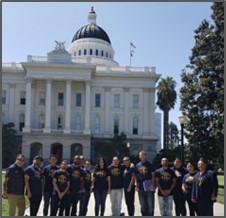Access to Higher Education
We’re Working to Build a Prison to University Pipeline by Increasing the Number of Formerly Incarcerated People in Higher Education. We Do This by Supporting the Development of Similar Programs at Other Colleges and by Advocating for Policies That Increase Access to Higher Education for All Currently and Formerly Incarcerated People. We Work With Admissions Professionals, Deans, and Faculty on Uc and Community College Campuses to Eliminate Barriers to Higher Education Faced by Criminal Justice Impacted Students and Advocate on Their Behalf in Cases Involving Their Parole and Probation Officers.
UC System Advocacy
We Advocate Within the UC System to Make UC Campuses More Accessible and Safe for Incarcerated and Formerly Incarcerated Students. We Helped Ban the Box on Uc Employment Applications in 2017. We Are Currently Advocating for the Expansion of the Underground Scholars Model, an Accessible UC Application for Our Incarcerated Students, and Creating More Resources to Address the Specific Barriers That Incarcerated and Formerly Incarcerated UC Students Face.
Underground Scholars Policy Fellowship
We Offer a Year Long Policy Training Institute for Formerly Incarcerated People UC Students. Students in This Program Learn How to Develop Policy Proposals, Pitch Them to Legislators, and Advocate to Move These Bills Through the Legislative Process Through Coalition Building, Research, Strategic Communications, Community Organizing and Advocacy.
Read more about our policy fellowship:
Pushing to Remove Legal Barriers for Formerly Incarcerated Students, January 5, 2023 | Ivan Natividad, UC Berkeley

Each year our policy fellows and Underground Scholars Initiative student leaders engage in legislative advocacy to remove barriers and create opportunities for incarcerated and formerly incarcerated students.
Restoring Cal Grant to Incarcerated Students, SB 575 (2019):
SB 575 would’ve restored Cal Grants to incarcerated students. Underground Scholar, Aminah Elster, provided expert testimony for SB 575. This bill was vetoed by Governor Newsom. Partners: Senator Bradford, Root and Rebound, Project Rebound, Anti Recidivism Coalition, #Cut50, Ella Baker Center for Human Rights, Corrections to College CA, and others.
Parole Reform for Education, AB 277, AB 2342 (2019, 2020):
To allow people on parole to earn early release from parole for completing college and other educational programs. One of our student leaders, Daniela Medina, provided expert testimony for AB 277 in the Public Safety Committee in 2019. AB 277 didn't pass in 2019 so we tried again in 2020 with AB 2342 which was passed by the legislature but vetoed by Governor Newsom. Partners: Assembly member McCarty, Anti Recidivism Coalition, #Cut50, Californians for Safety and Justice, Root and Rebound, Young Women’s Freedom Center, Legal Services for Prisoners with Children, Project Rebound, Ella Baker Center for Human Rights, Initiate Justice, ACLU, and others.
Banning the Box in Higher Education, SB 118 (Signed into law 2020):
We were involved in the coalition that helped pass SB 118 which banned the box asking about criminal convictions on all California college applications. Partners: Senator Skinner, Root & Rebound, LSPC, Project Rebound, #Cut50, and others.
Incarcerated Students Bill of Rights, SB 416 (Signed into law 2021):
We co-sponsored this bill to require the CDC(r) to make college programs available for the benefit of incarcerated people with a general education development certificate or equivalent or a high school diploma and to require those college programs to only be provided by the California Community Colleges, the California State University, the University of California, or other regionally accredited, nonprofit colleges or universities. The bill also provides a set of criteria to prioritize various college programs, including face-to-face instruction, comprehensive in-person support, and coordination with nonprofit postsecondary programs serving formerly incarcerated students. The bill requires the education providers to be responsible for determining and developing their curricula and degree pathways, determining certificate pathways, providing instructional staff, and determining what services will be offered to ensure incarcerated students can successfully complete the course of study. This bill requires an person enrolled in a full-time college program, as specified, to be deemed by the department to be assigned to a full-time work or training assignment. Partners: Senator Hueso, Legal Services for Prisoners with Children, Michelson Center for Public Policy, Project Rebound Consortium, Root & Rebound.
Parole Transfer Bill, SB 990 (Signed into law 2022):
This bill allows people on parole to transfer their parole to a different county if they have an academic, employment, or housing opportunity in that county. The bill also requires a person on parole to be granted a permit to travel outside the county of commitment to a location where the person has postsecondary educational or vocational training program opportunities, an employment opportunity, or inpatient or outpatient treatment. Partners: Senator Hueso, Root & Rebound, Michelson Center for Public Policy.
Mandela Act, AB 280 (2022 - 2023):
This bill would prohibit a facility from holding an individual in segregated confinement for more than 15 consecutive days and no more than 45 days in a 180-day period, as specified. This bill would also prohibit a facility from imposing limitations on services, treatment, or basic needs; conducting out-of-cell programming opportunities in a smaller cage or therapy module; placing an individual in segregated confinement on the basis of confidential information, as specified; using specified restraints when an individual is in segregated confinement; and using segregated confinement as a means of protecting an individual. Partners: Assembly member Holden: California Families Against Solitary Confinement, Immigrant Defense Advocates, California Collaborative for Immigrant Justice, Disability Rights California, Nextgen California. Governor Newsom vetoed this bill in 2022. The bill passed both houses in 2023 and was held by the author.